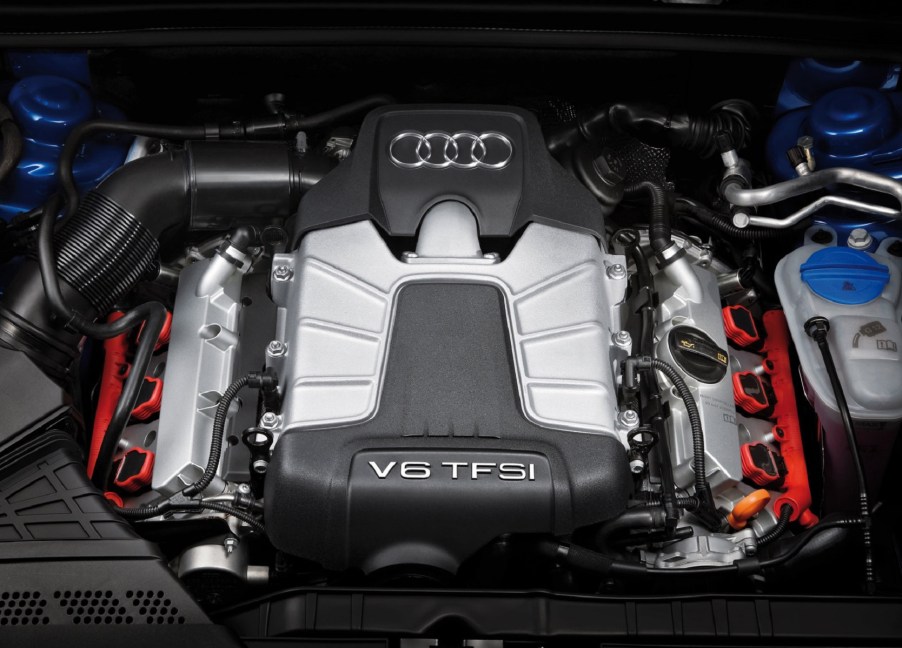
Which Used Audi Engines Are the Most Reliable?
With how expensive engine repairs can be, a used Audi can easily turn from bargain to nightmare. However, while some Audis can be problematic, not all of them are. And while no engine is truly perfect, the ones described below are fairly trouble-free.
For used Audis with a 1.8T or 2.0T, go with an EA113 or Gen 3 EA888 engine
Because Volkswagen owns Audi, the two brands often share engines. And as with used Volkswagens, the 1.8-liter and 2.0-liter turbocharged four-cylinder engines tend to be the most reliable. Haynes Manuals considers the 1.8T EA113 to be the best VW engine, and it was actually originally designed for Audi. And ItStillRuns, Car Engineer, Grassroot Motorsports, and Magic Auto Center all heap praise on its successor, the EA888.
This may seem at odds given the engine problems 2.0T-equipped 2009-2010 Audi A4 face. There was even a class-action lawsuit surrounding the EA888 engines, The Drive reports. Specifically, about failing timing-chain tensioners and heavy oil consumption. However, those issues were specifically for the ‘Gen 2’ EA888 engines, Motor Reviewer reports.

Starting in 2012, Audi introduced the ‘Gen 3’ EA888 engines, Car and Driver reports. They don’t suffer from the same maladies as the Gen 1 and Gen 2 ones, Engines Work reports. And modern revised replacement parts have resolved any early ignition-coil failures.
Admittedly, they do experience carbon build-up, but that’s common for all direct-injection engines. The only other potential flaws with Gen 3 EA888 engines are thermostat housing and PCV valve failure, VW Tuning and FCP Euro report. However, these appear to be related to age and improper maintenance, Car Worklog reports.
If you don’t want to deal with potential EA888 issues, the 1.8T and 2.0T EA113 engines are also fairly solid, Motor Reviewer reports. The first-gen Audi TT, one of the most reliable used Audis, had the 1.8T, after all.
That being said, the EA113 engines are known to consume oil, but that’s a feature, not a bug, TorqueCars reports. And the 2.0T engines’ high-pressure fuel pump cam follower, the part that links the pump with the crankshaft, can fail, Bar-Tek Tuning reports. Luckily, there are kits to convert the EA113 to the EA888’s upgraded version of the part.
The 4.2-liter V8 is generally reliable, except on the B6 and B7 S4

Another seemingly-odd choice for a reliable used Audi engine is the 4.2-liter V8. On the one hand, Ward’s Auto and Eurosport Tuning hold high opinions of it. But on the other hand, the trouble-prone B7- and B6-gen S4s used it.
However, as with the EA888 engines, many of the complaints surrounding the 4.2-liter Audi V8 focus on timing-chain tensioner failure. And as with the EA888, upgraded replacement parts are available, RSW reports. More to the point, later cars with this engine, such as the B8 Audi S5, the R8, and the RS5, don’t seem to have this issue. That might be because the S5’s, R8’s, RS5’s, Q7’s, A6’s, and A8’s tensioners are designed differently, FCP Euro reports.
Apart from carbon deposits—again, direct-injection engines—the RS5’s and R8’s engines are fairly trouble-free, Drive.com.au and Reliability Index report. And while the Q7 had some recalls, none are focused on the V8 engine, AutoExpress reports.
For six Audi cylinders, go with the VR6 or supercharged V6 engines
Volkswagen also spread the VR6 engine into the Audi lineup. The Audi TT and A3 used a version of the 3.2-liter VR6 found in the R32, while the Q7 got a 3.6-liter version, Motor Reviewer reports. While the VR6 isn’t perfect, its main flaws—ignition coil/coil pack and coolant pipe failure—have been addressed with more durable replacement parts.

But there’s another choice for a reliable used six-cylinder Audi engine: the ‘3.0T’ supercharged V6. Both the S4 and S5 switched to it from the 4.2-liter V8, and it spread to the Q5, Q7, A8, A7, and A6, Deutsche Auto Parts reports. Admittedly, some early models experienced water pump and thermostat housing leaks. But in post-2012 cars, the 3.0T is a stout and reliable engine, FCP Euro reports. Plus, no timing chain issues, and unless the PCV valve fails, no oil consumption problems.
Follow more updates from MotorBiscuit on our Facebook page.


